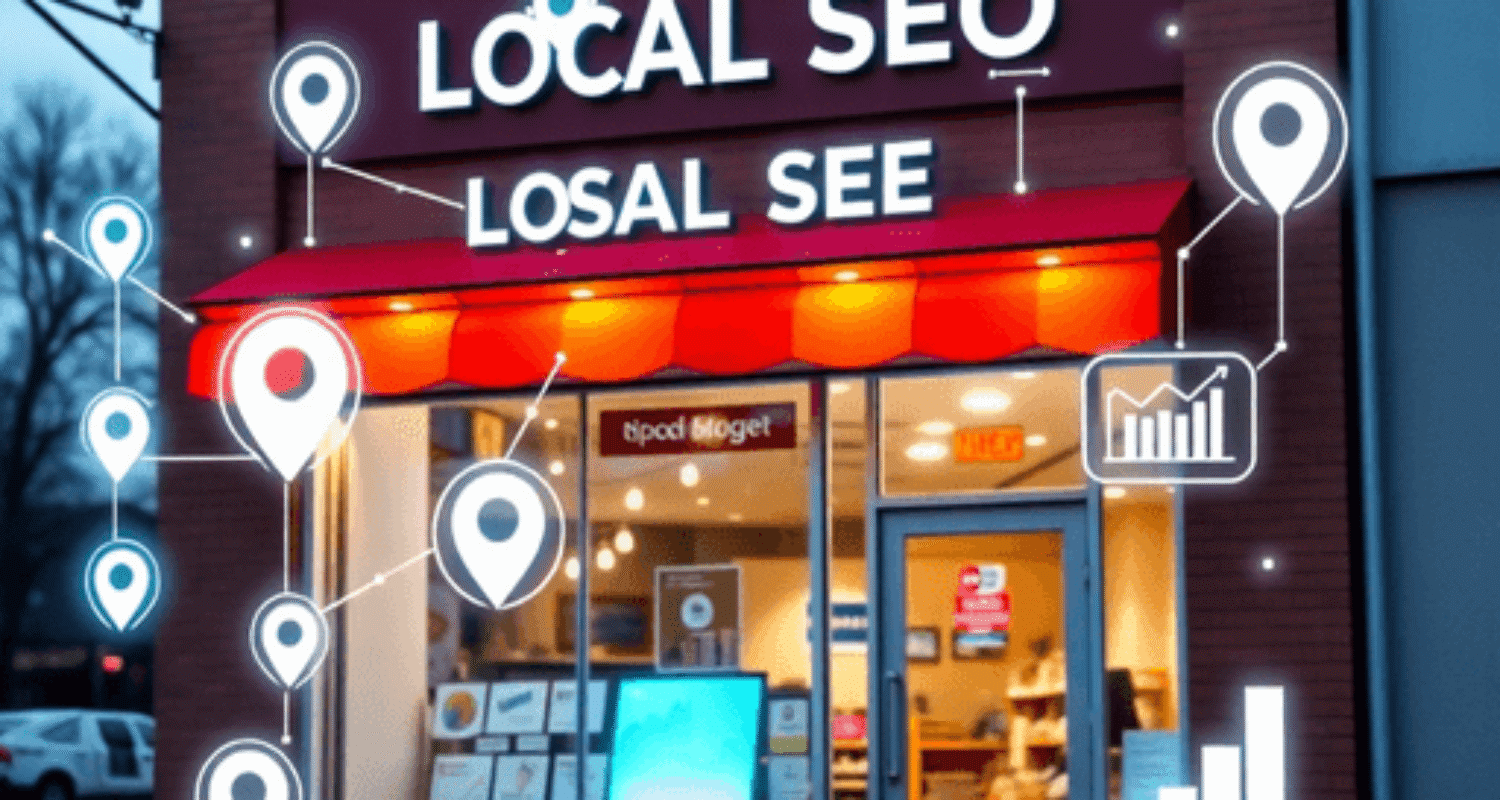Artificial Intelligence (AI) is changing the way small businesses connect with their communities online through local SEO. Unlike traditional methods, AI local SEO tools can analyze large amounts of data to understand user intent and specific search patterns in a particular area.
With the help of AI, businesses can optimize their content to directly appeal to local audiences by using relevant language and preferences. This gives small businesses a competitive advantage in their SEO strategies.
Here are some ways AI is benefiting small businesses in local SEO:
- Targeting specific areas: AI helps identify important keywords and trends that are unique to certain regions.
- Saving time: Tasks such as researching keywords, creating content, and auditing websites can now be done automatically, resulting in quicker outcomes.
- Maintaining accuracy: Brand information remains correct and up-to-date across all platforms with minimal manual effort.
AI is revolutionizing local SEO by allowing even businesses with limited resources to compete for top positions in search results, increase engagement, and improve visibility where it matters most: in their own neighborhood.

Key Ways AI is Used in Local SEO and Content Optimization
AI-driven tools are redefining local SEO by automating complex processes, uncovering hidden opportunities, and providing actionable insights that drive hyper-local results. Businesses looking to dominate their local niche must leverage these advancements to stay ahead. Here’s how artificial intelligence is making a significant impact across the most critical aspects of local search optimization and content strategy:
1. AI Keyword Research: Unlocking Hyper-Local Opportunities
Effective keyword research forms the backbone of any strong local SEO campaign. Manual approaches often miss nuances in language, search trends, and intent—especially at the neighborhood or suburb level. AI keyword research tools change the game by:
- Automating Data Collection: AI scans vast amounts of search data to surface high-potential keywords quickly, saving countless hours compared to manual research.
- Identifying Hyper-Local Keywords: By analyzing location-specific queries, AI easily uncovers keywords tied specifically to suburbs, landmarks, or even street names—keywords that traditional tools may overlook.
- Understanding Local Vernacular: Machine learning models interpret slang, colloquial terms, and regional phrases unique to specific communities. This ensures your content speaks directly to your target audience’s vocabulary.
- Search Intent Analysis: AI-powered systems don’t just look at what people are searching for—they analyze the why behind those searches. This deeper understanding helps tailor landing pages and blog posts around intent, not just keywords.
Example: A Brisbane café could use AI tools to discover that “best flat white West End” outperforms generic phrases like “Brisbane coffee shop” for their target market.
2. Content Creation: Generating Hyper-Localized Content with AI
Google rewards websites with content that’s not only relevant but also uniquely tailored to each user’s location and needs. Artificial intelligence now plays a central role in scaling this process without sacrificing quality.
- AI-Generated Content Outlines: Tools quickly assemble robust outlines based on competitor analysis, trending topics, and semantic relevance for a specific location.
- Hyper-Localized Articles: With access to databases of local facts, events, and user-generated content (such as reviews), AI crafts articles focused on neighborhoods or districts—think “Family-Friendly Parks in Teneriffe” or “Best Vegan Bakeries near South Bank.”
- Content Optimization: AI doesn’t just write; it refines. By assessing readability scores, keyword distribution (like those provided by this guide on content optimization), schema markup opportunities, and even sentiment, these platforms enhance existing content for maximum SEO value.
- Consistent Tone & Quality: Businesses with multiple locations benefit from maintaining brand voice across all city-specific pages—even with different writers or agencies involved.
“AI-generated content isn’t about replacing human creativity; it’s about amplifying your reach while ensuring every page resonates locally.”
3. Google Business Profile (GMB) Optimization: Automation for Accuracy & Consistency
A business’s Google Business Profile (formerly Google My Business) is often the first thing potential customers see in local searches or map results. Keeping this profile accurate across multiple locations can be a logistical challenge—a perfect fit for automation powered by AI.
- Automated Business Profile Updates: Address changes, holiday hours, new photos, service listings—AI bots handle these updates immediately across all platforms.
- Consistency Across Locations: For franchises or businesses with multiple outlets, maintaining uniformity in GMB profiles becomes crucial. Automated systems ensure every listing adheres to brand guidelines while still catering to local nuances.
- Review Monitoring & Response: Online reviews significantly influence consumer decisions. AI tools monitor reviews across platforms like Yelp and TripAdvisor, alerting businesses about new feedback and suggesting appropriate responses based on sentiment analysis.
By leveraging these capabilities offered through artificial intelligence solutions tailored specifically towards local SEO efforts—businesses can streamline operations while enhancing their online presence simultaneously!
More Ways to Optimize Local SEO with AI Technology
4. On-Page Optimization
AI technology offers real-time recommendations for optimizing website elements, enhancing aspects such as headlines, metadata, and structured data/schema markup. These improvements contribute to better visibility on search engines and an enhanced user experience.
- Headlines: AI tools can analyze existing headlines and suggest modifications to make them more engaging and relevant to local audiences. For example, incorporating location-specific keywords or phrases that resonate with the target demographic.
- Metadata: AI assists in refining meta titles and descriptions by suggesting optimal keyword placements and ensuring that these elements are tailored to local search intents. This can significantly increase click-through rates from search engine results pages (SERPs).
- Structured Data/Schema Markup: Implementing schema markup helps search engines understand the content of your website better. AI can automate the creation and updating of schema markup, ensuring that local business information such as address, phone number, and operating hours are accurately represented.
By leveraging AI-driven on-page optimization techniques, businesses can enhance their website’s visibility and relevance in local searches.
5. Local Citations and Link Building
Local citations and link building are critical components of a robust local SEO strategy. AI technology simplifies these processes through automation and intelligent analysis.
- Citation Opportunities: Identifying citation opportunities across various directories is essential for boosting local SEO. AI tools can scan hundreds of directories and suggest high-authority platforms where your business should be listed. This ensures consistent NAP (Name, Address, Phone number) information across all listings, which is vital for local search ranking.
- Competitor Backlink Analysis: Understanding competitor backlink profiles provides insights into potential linking opportunities. AI-powered analysis can identify high-value backlinks that competitors have secured and suggest similar opportunities for your business. This strategic approach allows businesses to build a strong backlink profile that enhances domain authority.
- Automated Outreach Efforts: Personalized outreach is crucial for successful link building. AI tools can automate outreach campaigns by generating customized messages based on recipient profiles and engagement history. This increases the likelihood of securing valuable backlinks while saving time and resources.
Incorporating AI in citation management and link building efforts streamlines these processes, resulting in more efficient execution and better outcomes for local SEO strategies.
By utilizing AI technologies for on-page optimization, citation identification, competitor analysis, and automated outreach, businesses can achieve significant improvements in their local SEO performance. The integration of these sophisticated tools not only enhances visibility but also fosters a more personalized connection with local audiences through precise targeting and relevant content delivery.
Advanced Applications of AI in Local SEO Strategy
Small Biz Optimize uses the latest AI tools to help businesses stand out in local search. As AI technology improves, it opens up new opportunities for enhancing customer interactions, understanding consumer behavior, and building a strong online reputation. By using AI for tasks like sentiment analysis, reputation management, review insights, and user experience optimization, we can take local SEO strategies to the next level—going beyond just focusing on keywords and basic optimization techniques.
6. Customer Review Management: Sentiment Analysis & Reputation Signals
Customer reviews are now essential for local businesses looking to excel in their industry. With the help of AI-powered sentiment analysis, we can analyze thousands of reviews across platforms such as Google, Facebook, Yelp, and TripAdvisor to uncover meaningful themes and actionable insights.
Key AI Applications in Review Management:
- Automated Sentiment Analysis:
- Machine learning models evaluate the emotional tone of each review.
- Theme Extraction:
- Clustering algorithms group similar comments (e.g., “friendly staff”, “slow delivery”).
- Response Prioritization:
- AI flags high-impact reviews (positive or negative) that require authentic, timely responses.
Example: A café in Brisbane might use AI to discover rising mentions of “great vegan options” in its Google reviews. This insight can drive social media campaigns highlighting their plant-based menu, reinforcing a unique selling point.
Reputation Signals Enhanced by AI Insights:

- Consistent monitoring with AI keeps your business profile aligned with evolving customer expectations.
- By acting on real-time feedback trends uncovered through sentiment analysis, you strengthen your position in local search rankings.
7. Predictive Analytics & Behavior Insights
AI’s ability to process large amounts of data enables predictive analytics—a game-changer for anticipating changes in local market demand and consumer preferences.
How Predictive Analytics Shapes Local SEO:
- Behavioral Forecasting:
- Algorithms analyze patterns from website analytics, historical search queries, review velocity, and seasonal trends.
- Dynamic Strategy Adjustments:
- Real-time adaptation to Google algorithm changes based on continuous monitoring.
- Hyperlocal Consumer Profiling:
- Segment audiences within a suburb or postcode based on interests identified from aggregated digital footprints.
For example: A home services company in Brisbane can use AI-driven analytics to forecast increased interest in air conditioning maintenance ahead of summer heatwaves—launching targeted ads and website content weeks before the surge peaks.
8. User Experience Enhancements: Personalization with Chatbots & Smart Interactions
Creating smooth customer experiences is crucial for turning local searchers into loyal customers. AI technologies like chatbots and recommendation engines enable businesses to personalize every stage of the user journey:
AI-Powered Personalization Tools:
- Local Chatbots:
- Provide instant answers to frequently asked questions (e.g., opening hours, directions, menu details) tailored to each location.
- Smart Interactions:
- Use machine learning algorithms to analyze user behavior and preferences—offering personalized recommendations based on past purchases or browsing history.
By implementing these advanced applications of AI in your local SEO strategy, you can gain a competitive advantage and deliver exceptional experiences that resonate with your target audience.
Challenges in Implementing AI for Local SEO and Content Optimization
AI is changing the game for small businesses in local SEO, but there are still several challenges when it comes to using these technologies. This is especially true for businesses that want to reach diverse communities or manage multiple online assets.
Multilingual SEO: Navigating Diverse Linguistic Audiences
With Australia being home to many cultures, brands need to use translation/localization with AI agents to connect authentically across languages. While tools like Google Translate and DeepL have improved, they still struggle with capturing regional dialects, cultural nuances, and local search intent.
Here are some of the challenges:
- Accuracy vs. Authenticity: Automated translations often struggle with context-specific phrases or idioms used by local audiences. An AI-generated phrase that makes sense in one dialect might sound awkward or even confusing in another.
- SEO Consistency: Localized content must not only be grammatically correct but also optimized for region-specific keywords. AI tools may miss subtle keyword variations that real users type into Google when searching for services in their native tongue.
- Brand Voice & Trust: Maintaining a consistent brand tone across languages is critical. Over-reliance on literal machine translations can erode trust and diminish the perceived professionalism of a business.
Small Biz Optimize recommends combining AI-driven localization with human review—especially for key landing pages, service descriptions, and culturally sensitive campaigns—to ensure both technical accuracy and emotional resonance.
Automation & Efficiency: Balancing Speed with Quality
Automation is at the core of what makes AI appealing to small businesses. Tasks like keyword research, competitor tracking, citation management, and posting schedules can now be done more efficiently through platforms such as SEMrush, SurferSEO, Ahrefs, ChatGPT-powered plugins, etc.
While these tools offer undeniable benefits:
- Loss of Nuanced Insight: Automated systems may overlook the subtleties of local markets or unique competitive landscapes that manual analysis would catch.
- Risk of Uniformity: Heavy automation can lead to repetitive content structures or generic keyword usage across multiple locations or posts.
- Dependency on Tool Reliability: Outages or algorithm changes in third-party AI tools can disrupt workflows unexpectedly. Small businesses relying solely on automation may find themselves unprepared to adapt quickly.
To maximize benefits while minimizing risks, integrating automation should be paired with periodic manual reviews and strategic oversight—ensuring campaigns remain unique, relevant, and fully aligned with business goals.
“AI tools are invaluable for scaling local SEO efforts efficiently; however, without the right checks and balances, they risk diluting your brand’s unique value proposition.”
— Small Biz Optimize Team
Addressing these challenges requires a careful combination of technology and human expertise—a balance crucial for sustainable growth in competitive local markets. This approach allows for smooth expansion into new linguistic areas while maintaining high-quality engagement across all digital platforms.
Overcoming Challenges in Using AI Tools For Local SEO Strategies
When integrating AI into local SEO strategies, businesses may encounter various challenges. One significant concern is the risks of over-reliance on generative AI leading to low-quality or repetitive content.
Potential Risks
- Quality Control: Generative AI can produce large volumes of content quickly, but this often comes at the expense of quality. Automated content may lack the nuanced understanding and creativity that human writers bring, resulting in text that feels generic or unengaging.
- Repetitiveness: AI tools might create content that is overly repetitive, failing to provide fresh perspectives or unique insights. This can hurt user engagement and negatively impact SEO rankings as search engines prioritize original, high-quality content.
- Contextual Accuracy: While AI excels in data analysis and pattern recognition, it sometimes struggles with context-related subtleties. This can lead to inaccuracies or misinterpretations in content tailored for specific local audiences.
Mitigation Strategies
Businesses can overcome these challenges by:
- Combining Human Expertise with AI: Use AI-generated drafts as a foundation and let skilled writers refine and enhance these drafts. This synergy ensures the final output maintains high quality while leveraging the efficiency of AI.
- Regular Audits: Implement routine checks to assess the quality and relevance of AI-generated content. Adjust algorithms and input parameters based on audit findings to continuously improve outcomes.
- Diversified Content Creation: Complement AI-driven efforts with diverse content formats like videos, infographics, and personalized narratives to keep the audience engaged.
By addressing these potential risks head-on, businesses can harness the power of AI for local SEO without compromising on quality and originality.
Resource Demands for Implementing AI Tools For Local SEO Strategies
Implementing AI tools for local SEO strategies requires significant resource allocation. Businesses must consider the financial investments necessary to deploy these advanced technologies effectively.
Key Resource Allocation Areas
- Technology Investments:
- AI Software and Tools: Advanced AI-driven software solutions for keyword research, content creation, and optimization.
- Hardware Requirements: Infrastructure upgrades to support AI processing, including servers and storage.
- Human Resources:
- Training and Development: Continuous education for staff to stay updated with AI advancements and best practices.
- Specialized Personnel: Hiring experts in AI technology and local SEO to manage and optimize the tools.
- Financial Investments:
- Budget planning for initial setup costs, ongoing subscription fees for AI tools, and potential scaling needs.
- Allocation for unexpected expenses related to technology maintenance or upgrades.
- Time Commitment:
- Time needed to integrate AI systems into existing workflows efficiently.
- Regular monitoring and adjustments based on performance analytics provided by AI tools.
Ensuring proper resource allocation is crucial in harnessing the full potential of AI for local SEO. By investing adequately in technology, human resources, financial planning, and time management, businesses can successfully implement AI solutions that drive significant improvements in their local search visibility and overall digital marketing strategy.
Conclusion
AI local SEO has changed the way small businesses approach their online strategies, giving them a competitive edge and opening up new growth opportunities. Using AI-powered tools offers:
- Improved keyword targeting: Specific search insights tailored to your audience’s language and intent
- Automated content optimization: Consistent messaging that is relevant to the region and drives engagement
- Smarter review management and predictive analytics: Proactive response strategies and data-driven decision-making
Understanding how to use AI-powered SEO is now essential for businesses who want to dominate their local markets. By using these advanced tools, businesses can achieve greater efficiency, increased visibility, better user experiences, and higher rankings—surpassing competitors who still rely on old-fashioned methods. Small Biz Optimize helps brands use these innovations to achieve measurable results, positioning clients as leaders in their communities. To stay ahead in this ever-changing landscape, businesses must fully embrace the power of AI in their local SEO strategy.
FAQs (Frequently Asked Questions)
What is AI local SEO and why is it important for modern businesses?
AI local SEO refers to the integration of artificial intelligence technologies in optimizing search engine strategies specifically for local markets. It is important because it leverages AI’s capabilities to enhance keyword research, content creation, and business profile management, thereby improving local search visibility and attracting more targeted customers.
How does AI improve keyword research for local SEO?
AI automates and refines keyword research by uncovering high-potential hyper-local keywords tailored to specific regions or neighborhoods. It understands local vernacular and search intent more accurately, enabling businesses to target the right audience with relevant keywords that boost their local SEO performance.
In what ways can AI assist with Google Business Profile optimization?
AI tools automate updates to business profiles on platforms like Google Business Profile by ensuring accurate and consistent information across multiple locations. This automation helps maintain up-to-date business details, enhancing credibility and visibility in local search results.
What advanced applications of AI are transforming local SEO strategies?
Advanced AI applications in local SEO include sentiment analysis for customer review management, predictive analytics to understand consumer behavior, real-time adaptation to evolving Google algorithms, and user experience enhancements through AI-powered chatbots that personalize customer interactions and improve engagement.
What challenges might businesses face when implementing AI for local SEO and how can they overcome them?
Challenges include managing translation and localization for diverse linguistic audiences using AI agents, avoiding over-reliance on generative AI which can produce low-quality or repetitive content, and allocating sufficient financial resources for AI tool implementation. Overcoming these requires strategic planning, quality control measures, and investment in appropriate AI solutions tailored to business needs.
How does AI contribute to content optimization in local SEO?
AI contributes by generating hyper-localized content such as articles and outlines optimized for specific regions or neighborhoods. It enhances overall content quality by analyzing search intent and providing real-time recommendations on website elements like headlines, metadata, and structured data to improve relevance and search engine visibility.




